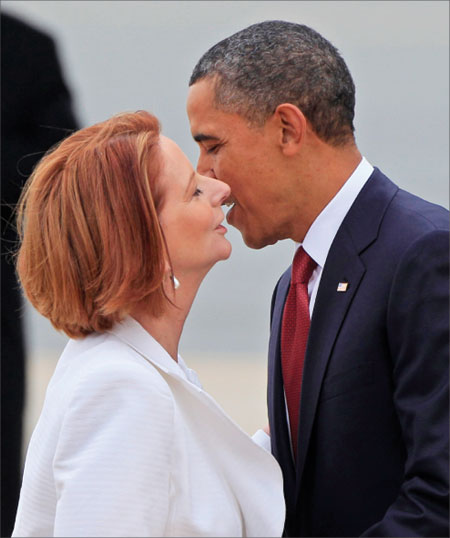Obama beefs up defense ties
Updated: 2011-11-17 10:54
By Hu Yinan and Zheng Yangpeng (China Daily)
|
|||||||||
|
Australian Prime Minister Julia Gillard welcomes United States President Barack Obama to Canberra on Wednesday. The two leaders unveiled plans to deepen the US military presence in the Asia-Pacific, with 2,500 US Marines operating out of a de facto base in northern Australia. Rick Rycroft / Reuters |
Renewing alliances may not be best option, China says
BEIJING / Canberra - Visiting United States President Barack Obama on Wednesday said his administration will boost military activities in Australia in 2012, as Washington "steps up its commitment" in the Asia-Pacific region.
The deployment of 200 to 250 Marines will begin next year and grow to 2,500, Australian Prime Minister Julia Gillard said during a joint news conference with Obama in Canberra.
The US troops will be deployed to Australia's northern port of Darwin, just 820 km from Indonesia, close to the South China Sea.
In response, Chinese Foreign Ministry spokesman Liu Weimin on Wednesday said renewing historic alliances might not be the best option. The United States and Australia have been defense treaty partners for 60 years, and US Secretary of State Hillary Clinton just wrapped up a visit to the Philippines, a former US colony that also has a 60-year-old security pact with Washington.
"Faced with a gloomy global economy, whether broadening military alliances is an effective model for regional integration is worth discussing," Liu said during a regular news briefing in Beijing.
Liu's remark came as Obama said the US neither fears nor wants to exclude China from its economic alliances in the Asia-Pacific, and just after Clinton reassured Manila that "the United States will always be in the corner of the Philippines, and we will stand and fight with you".
Washington will also "update" relationships with its three other treaty-bound allies in the region - Japan, South Korea and Thailand, Clinton said last week in Hawaii, while noting that the alliances "are the fulcrum for our efforts in the Asia-Pacific". Clinton arrived in Thailand late Wednesday.
"We need a serious discussion within our politics and our nation about whether a bigger US military presence is a good idea or not. We shouldn't fall into the ritualistic description of the 'special relationship' when hard thinking about the pros and cons of closer military relations is necessary," Brendon O'Connor, a professor with the United States Studies Center at University of Sydney, said in an article on The Conversation website.
Xinhua News Agency said in a commentary on Wednesday that "potentially triggering or stoking tensions in the region, the US has for the past several years staged dozens of military exercises there along with its regional allies Japan, the Philippines and South Korea".
Washington is worried about China's growing influence, said Niu Xinchun, deputy director of the Institute of American Studies at the China Institutes of Contemporary International Relations, adding that the military deployment in Australia is multipurpose and not exclusively targeted at China.
Obama and Clinton will head to Bali, Indonesia, this weekend for a regional forum, in which the US expects a "candid discussion" of territorial disputes in the South China Sea. The meeting will be attended by members of the Association of South East Asian Nations (ASEAN), as well as China, Japan and South Korea. The US will take part for the first time.
China rejects the idea of bringing any contentious issues to the forum because this would jeopardize existing regional dynamics, said Foreign Ministry spokesman Liu.
"Intervention by external forces will not help resolve the (South China Sea) issue. Until the issue is resolved, we should set differences aside and jointly develop the region," he said.
Chandra Muzaffar, an international affairs analyst in Malaysia, was quoted earlier as saying by Xinhua that ASEAN countries may have been manipulated by the US.
"I don't think it is good for ASEAN to be so closely linked to the US because Washington has its own agenda as far as this region is concerned," said Muzaffar, a professor of Global Studies at the Science University of Malaysia.
A group of left-wing activists attacked Clinton's convoy following her talks with Filipino President Benigno Aquino III on Wednesday afternoon.
The activists - numbering around 50 - managed to stop the convoy and briefly turn it back before they were pushed back by police and troops.
Also on Wednesday, another activist, identified as Marjohara Tucay, briefly disrupted the forum attended by Clinton at the National Museum and called for the scrapping of the US-Philippines Visiting Forces Agreement.
The agreement, signed in 1998, is a support deal to the 1951 Mutual Defense Treaty that requires the two countries to support each other when either is attacked by external forces.
"There was nothing mutual in the Mutual Defense Treaty," Tucay shouted.












